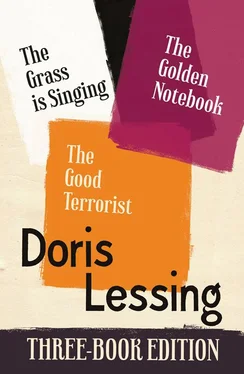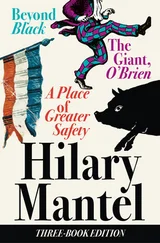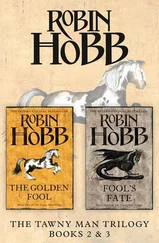The more one thinks about it, the more extraordinary the case becomes. Not the murder itself; but the way people felt about it, the way they pitied Dick Turner with a fine fierce indignation against Mary as if she were something unpleasant and unclean, and it served her right to get murdered. But they did not ask questions.
For instance, they must have wondered who that ‘Special Correspondent’ was. Someone in the district sent in the news, for the paragraph was not in newspaper language. But who? Marston, the assistant, left the district immediately after the murder. Denham, the policeman, might have written to the paper in a personal capacity, but it was not likely. There remained Charlie Slatter, who knew more about the Turners than anyone else, and was there on the day of the murder. One could say that he practically controlled the handling of the case, even taking precedence over the Sergeant himself. And people felt that to be quite right and proper. Whom should it concern, if not the white farmers, that a silly woman got herself murdered by a native for reasons people might think about, but never, never mentioned? It was their livelihood, their wives and families, their way of living, at stake.
But to the outsider it is strange that Slatter should have been allowed to take charge of the affair, to arrange that everything should pass over without more than a ripple of comment.
For there could have been no planning: there simply wasn’t time. Why, for instance, when Dick Turner’s farm boys came to him with the news, did he sit down to write a note to the Sergeant at the police camp? He did not use the telephone.
Everyone who has lived in the country knows what a branch telephone is like. You lift the receiver after you have turned the handle the required number of times, and then, click, click, click, you can hear the receivers coming off all over the district, and soft noises like breathing, a whisper, a subdued cough.
Slatter lived five miles from the Turners. The farm boys came to him first, when they discovered the body. And though it was an urgent matter, he ignored the telephone, but sent a personal letter by a native bearer on a bicycle to Denham at the police camp, twelve miles away. The Sergeant sent out half a dozen native policemen at once, to the Turners’ farm, to see what they could find. He drove first to see Slatter, because the way that letter was worded roused his curiosity. That was why he arrived late on the scene of the murder. The native policemen did not have to search far for the murderer. After walking through the house, looking briefly at the body, and dispersing down the front of the little hill the house stood on, they saw Moses himself rise out of a tangled ant-heap in front of them. He walked up to them and said (or words to this effect): ‘Here I am.’ They snapped the handcuffs on him, and went back to the house to wait for the police cars to come. There they saw Dick Turner come out of the bush by the house with two whining dogs at his heels. He was off his head, talking crazily to himself, wandering in and out of the bush with his hands full of leaves and earth. They let him be, while keeping an eye on him, for he was a white man, though mad, and black men, even when policemen, do not lay hands on white flesh.
People did ask, cursorily, why the murderer had given himself up. There was not much chance of escape. But he did have a sporting chance. He could have run to the hills and hidden for a while. Or he could have slipped over the border to Portuguese territory. Then the District Native Commissioner, at a sundowner party, said that it was perfectly understandable. If one knew anything about the history of the country, or had read any of the memoirs or letters of the old missionaries and explorers, one would have come across accounts of the society Lobengula ruled. The laws were strict: everyone knew what they could or could not do. If someone did an unforgivable thing, like touching one of the King’s women, he would submit fatalistically to punishment, which was likely to be impalement over an ant-heap on a stake, or something equally unpleasant. ‘I have done wrong, and I know it,’ he might say, ‘therefore let me be punished.’ Well, it was the tradition to face punishment, and really there was something rather fine about it. Remarks like these are forgiven from native commissioners, who have to study languages, customs, and so on; although it is not done to say things natives do are ‘fine’ (Yet the fashion is changing: it is permissible to glorify the old ways sometimes, providing one says how depraved the natives have become since.)
So that aspect of the affair was dropped, yet it is not the least interesting, for Moses might not have been a Matabele at all. He was in Mashonaland; though of course natives do wander all over Africa. He might have come from anywhere: Portuguese territory, Nyasaland, the Union of South Africa. And it is a long time since the days of the great king Lobengula. But then native commissioners tend to think in terms of the past.
Well, having sent the letter to the police camp, Charlie Slatter went to the Turners’ place, driving at a great speed over the bad farm roads in his fat American car.
Who was Charlie Slatter? It was he who, from the beginning of the tragedy to its end, personified Society for the Turners. He touches the story at half a dozen points; without him things would not have happened quite as they did, though sooner or later, in one way or another, the Turners were bound to come to grief.
Slatter had been a grocer’s assistant in London. He was fond of telling his children that if it had not been for his energy and enterprise they would be running round the slums in rags. He was still a proper cockney, even after twenty years in Africa. He came with one idea: to make money. He made it. He made plenty. He was a crude, brutal, ruthless, yet kindhearted man, in his own way, and according to his own impulses, who could not help making money. He farmed as if he were turning the handle of a machine which would produce pound notes at the other end. He was hard with his wife, making her bear unnecessary hardships at the beginning; he was hard with his children, until he made money, when they got everything they wanted; and above all he was hard with his farm labourers. They, the geese that laid the golden eggs, were still in that state where they did not know there were other ways of living besides producing gold for other people. They know better now, or are beginning to. But Slatter believed in farming with the sjambok. It hung over his front door, like a motto on a wall: ‘You shall not mind killing if it is necessary.’ He had once killed a native in a fit of temper. He was fined thirty pounds. Since then he had kept his temper. But sjamboks are all very well for the Slatters; not so good for people less sure of themselves. It was he who had told Dick Turner, long ago, when Dick first started farming, that one should buy a sjambok before a plough or a harrow, and that sjambok did not do the Turners any good, as we shall see.
Slatter was a shortish, broad, powerful man, with heavy shoulders and thick arms. His face was broad and bristled; shrewd, watchful, and a little cunning. He had a crop of fair hair that made him look like a convict; but he did not care for appearances. His small blue eyes were hardly visible, because of the way he screwed them up, after years and years of South African sunshine.
Bent over the steering wheel, almost hugging it in his determination to get to the Turners quickly, his eyes were little blue chinks in a set face. He was wondering why Marston, the assistant, who was after all his employee, had not come to him about the murder, or at least sent a note. Where was he? The hut he lived in was only a couple of hundred yards from the house itself. Perhaps he had got cold feet and run away? Anything was possible, thought Charlie, from this particular type of young Englishman. He had a rooted contempt for soft-faced, soft-voiced Englishmen, combined with a fascination for their manner and breeding. His own sons, now grown up, were gentlemen. He had spent plenty of money to make them so; but he despised them for it. At the same time he was proud of them. This conflict showed itself in his attitude towards Marston: half hard and indifferent, half subtly deferential. At the moment he felt nothing but irritation.
Читать дальше






![Theresa Cheung - The Dream Dictionary from A to Z [Revised edition] - The Ultimate A–Z to Interpret the Secrets of Your Dreams](/books/692092/theresa-cheung-the-dream-dictionary-from-a-to-z-r-thumb.webp)





